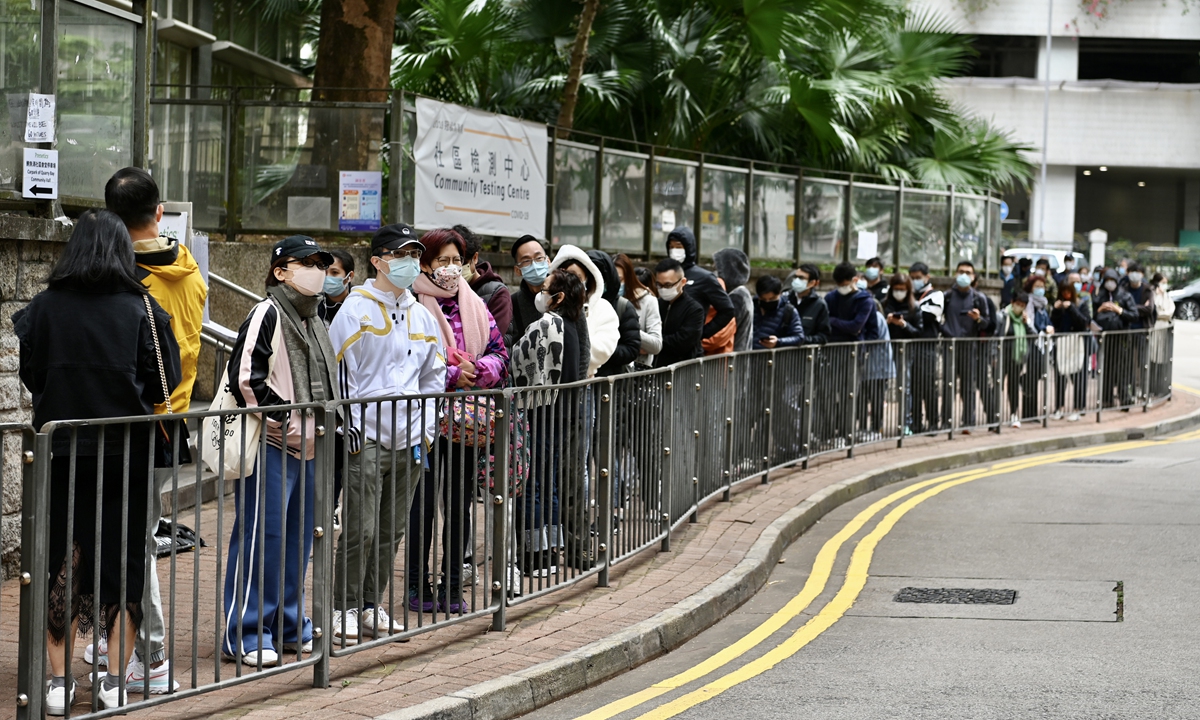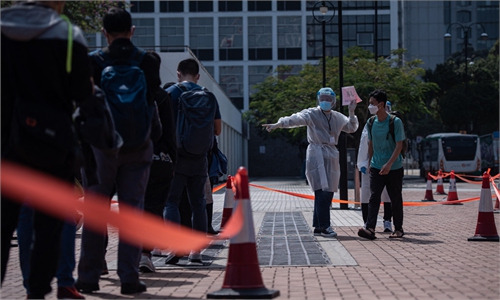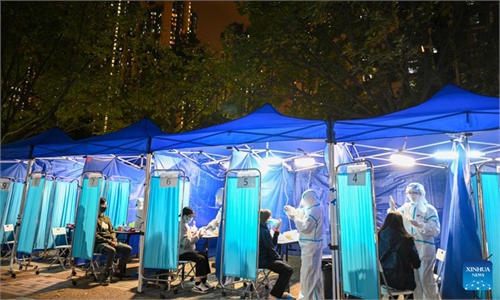
Hong Kong residents line up to take nucleic acid tests on February 10, 2022. Photo: cnsphoto
The Chinese mainland sent its first batch of experts on Thursday to the Hong Kong Special Administrative Region (HKSAR), one day after instructions from President Xi Jinping were reported to aid Hong Kong in the fight against the surging COVID-19 epidemic in the city, which reported 6,116 confirmed cases on Thursday.
In the four-member team are national-level epidemiologists. Kang Min, the team leader, is head of the infectious disease institute of the Guangdong Provincial Center for Disease Control and Prevention. He has participated in the handling of MERS, H5N1 and H7N9. The experts in the group all from Guangdong Province and are fluent in Cantonese and English and familiar with Hong Kong society.
The team could mobilize more resources from the mainland to assist Hong Kong based on its needs, He Qinghua of the National Health Commission (NHC) told media. Prior to their visit, Kang said they will work with Hong Kong experts in infection screening and epidemic risk analysis.
In addition to the expert team, Guangdong also sent nucleic acid testing vehicles to Hong Kong on Thursday under the command of Wang Hesheng, deputy director of the NHC. Wang had led Wuhan to fight the epidemic two years ago when he was a member of the standing committee of the Communist Party of China Hubei provincial committee and director of the Hubei provincial health commission.
This batch of assistance to Hong Kong was made in a very rapid manner under the guidance of the central government, as it came one day after a top-level coordinating group meeting in Shenzhen led by Xia Baolong, head of the Hong Kong and Macao Affairs Office of the State Council, on Wednesday, also participated by Wang.
The four-member team is only one of multiple working groups set up by the mainland to aid Hong Kong. Media reported that more resources from the health system will be mobilized to assist Hong Kong, in which hundreds of patients were waiting to be admitted to hospitals.
On Thursday, 6,116 confirmed cases and an additional 6,300 preliminary positive cases were reported in Hong Kong. Hong Kong media said due to the strained medical system, some patients were quarantined in parking lots and near hospitals.
Lu Hongzhou, head of the Third People's Hospital of Shenzhen, told the Global Times that drawing experience from the mainland, containing the epidemic in Hong Kong will require a grasp of big data related to the epidemic. On the basis of the current self-testing, mass testing should be rolled out to cut off viral transmission chains.
Chief Executive Carrie Lam said Thursday that mass testing is an option to be considered if the testing capacity could be enhanced.
The Global Times learned from KingMed Diagnostics, a Guangzhou-based medical diagnostic testing company, that it is ready to aid Hong Kong in mass testing as it is escalating its testing capabilities to meet the demand. "With the operation of two or three more laboratories, we are able to increase the daily testing to 200,000 tubes."
But imposing strict home quarantine on some 3 million families is unrealistic in Hong Kong due to the lack of resources. Building makeshift hospitals is urgently needed, Lu said.
Zeng Guang, former chief epidemiologist of the Chinese Center for Disease Control and Prevention, told the Global Times that aid from the mainland can solve urgent situations in Hong Kong, including boosting mass nucleic acid tests and setting up emergency medical facilities.
A Beijing-based health expert said replicating how the mainland contains the virus is not realistic for Hong Kong if the city cannot seal off communities and conduct rounds of tests. As the epidemic has spread, the expert suggested treating patients with severe symptoms to reduce severe cases and deaths, such as setting up a COVID-19 treatment center in areas bordering Guangdong to treat severe patients.
Data revealed by Hong Kong on Thursday said 24 more patients died, raising the death toll to 258. More than 10 are in serious conditions.


